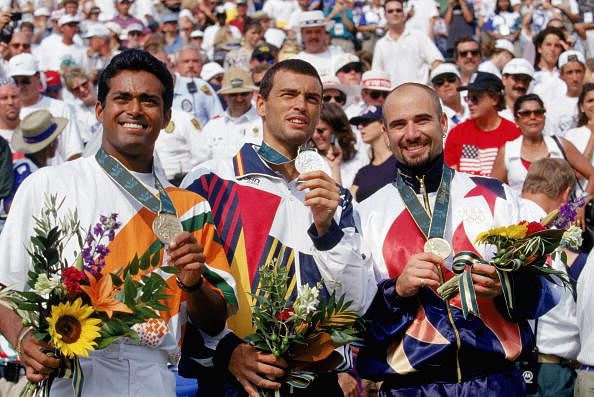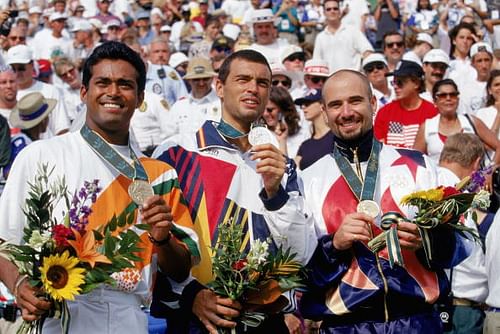
Olympics tennis flashback: When an inspired Leander Paes created history at Atlanta ’96

Tennis men’s singles finalist, left, bronze medal winner Leander Paes of India, center, silver medal winner Sergi Bruguera of Spain and, right, gold winner Andre Agassi celebrate during the Olympic Games on August 3, 1996 in Atlanta, Georgia. (Getty Images)
“In the semis I meet Leander Paes, from India. He’s a flying jumping bean, a bundle of hyperkinetic energy, with the tour’s quickest hands. Still, he’s never learned to hit a tennis ball. He hits off-speed, hacks, chips, lobs — he’s the Brad of Bombay. Then, behind all his junk, he flies to the net, covers so well that it seems to work. After an hour, you feel as if he hasn’t hit one ball cleanly — and yet he’s beating you soundly. Because I’m prepared, I stay patient, stay calm, and beat Paes 7-6 6-3.”
These were the words used by Andre Agassi to describe his Atlanta Olympics semi-final against Paes in his book “Open: An Autobiography”.
Leander Paes has a glittering record at tennis Grand Slams with 13 doubles titles. However, it is the mention of the 1996 Atlanta Olympics that really make his eyes light up. It was an inspired performance against the odds and expectations by Paes to win the Olympic bronze medal, which was India’s first individual medal in more than 4 decades.
There were almost no medal expectations from the 49-member Indian contingent at Atlanta, and Paes was a relatively unknown 23-year-old. Ranked 126 in the world singles rankings, he entered the singles draw through a wild-card.
He had reached the quarterfinals with Ramesh Krishnan at Barcelona Olympics four years earlier, but was yet to win a singles match in any Grand Slam. He had won the Wimbledon boys’ singles title, and had played some inspired matches for India in the Davis Cup, but no one had any real hopes from him in that edition of the Olympics.
Paes had his task cut out with a tricky draw. He faced world number 20 Richey Reneberg of the USA in the first round. The match was tied at one set each, when the American had to retire due to injury.
In the second round, he faced Venezuelan Nicolas Pereira, who was world number 74, and Paes didn’t have to break much sweat to see off his opponent’s challenge in straight sets. Paes admitted later that the thought of a medal first struck him after he won the second round, but he kept quiet, not wanting to raise expectations.
Buoyed by the victories, Paes continued his run by defeating much higher ranked and more fancied Thomas Enqvist (world number 10) and Renzo Furlan (world number 26) to qualify for the semi-final.
The semis had a stiff challenge waiting for him in the form of world number 3 and a winner of multiple Grand Slams, Andre Agassi, who had also been a seasoned Davis Cupper and relished the pressure of representing his country.
Paes stretched Agassi to a first-set tiebreak, but a missed volley at a crucial time handed the advantage to the American. Agassi used all his class and experience to close out the match at 7-6, 6-3. Paes lost the match, but won hearts.
Agassi complimented his opponent for his fight in the match, saying “He hit like maybe 25 drop shots. That’s strange. But just because he plays strange doesn’t mean it’s not good. It’s just strange.”
Agassi’s father Mike told Dr Vece Paes (Leander’s dad): “Amazing. My boy is supposed to play well, but your boy has been playing this week like a Top 4 player.” Former Wimbledon champion Virginia Wade said to Paes: “You were lovely”. Billie Jean King told Paes’ coach Jaideep Mukherjea: “You’ve got a raw talent there. He’s a Top 30 player for sure.”
Paes was aware that he had his chances in the match, and the outcome could have been different if he had taken them. When asked about his reaction after the match, he said “If I had lost 6-2, 6-2 to Agassi, it would have been fine, but to have come so close…” and then he became quiet, still pondering over the missed opportunity to qualify for the final and assure himself of a medal.